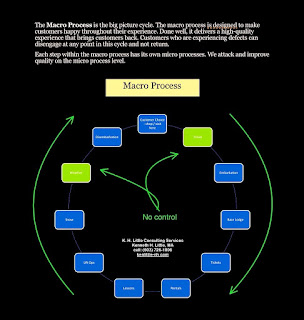A Typical New England Ski Area
***
Customers flow through this cycle beginning with “select your resort” to visit. There are many ski resorts in New England to pick from.
~ Why would they pick yours? Why might they not?
In general, once they choose to ski at your resort, they enter your Macro Cycle. There are steps you can control and steps you cannot control.
1. Travel to your location (no control)
2. Embarkation (arriving, off-loading, parking, etc.)
3. Base Lodge
4. Purchase Ticket (unless pass holder)
5. Rentals
7. Lessons
8. Lift Operations
9. Snow (making, grooming, etc.)
10. Weather (no control)
11. Disembarkation (pack up, get car, load gear, drive away)
Each step is a potential point of contact and an opportunity for the customer to be satisfied or disappointed.
While you cannot control the travel experience, it does impact how the customers arrive. Are they stressed / not stressed when they first enter your zone of responsibility.
The first point of contact may be the “Welcome to …” sign. This is your first opportunity to impress your arriving customers. How does your sign look? Is it clear, bright, well maintained? Are directions provided guiding the customer toward the off-loading area and available parking? Is the pavement intact, cleared of snow and ice?
Is the off-loading area well organized and efficient. Are customers able to easily navigate this process?
Next is parking, then Base Lodge?
K. H. Little Consulting Services
Kenneth H. Little, MA
cell: (603) 726-1006





